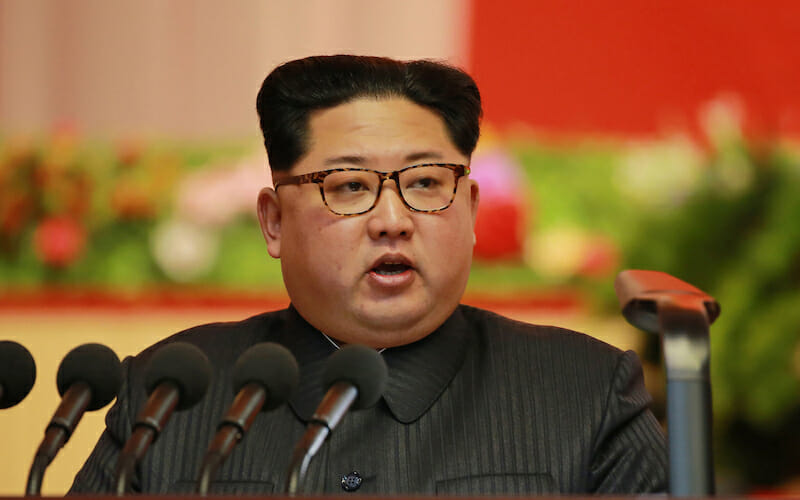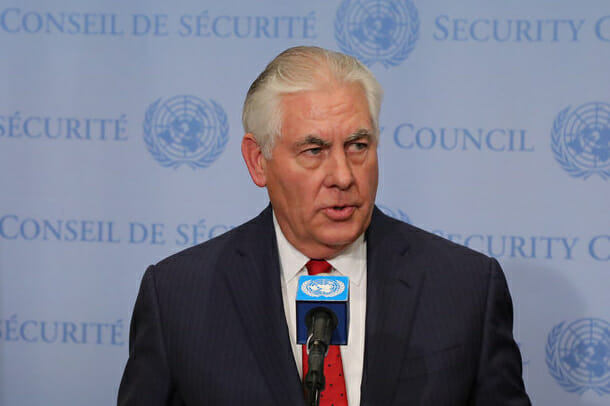
Preconditions to Conditions: Rex Tillerson on North Korea
The worst of times, and the best of times. This must be a sentiment that filters through the Trump administration as it discusses, disagrees and fights itself on how best to deal with Kim Jong-un and the North Korean situation. With a transactional presidency – one that treats deals as matters of pressure, deception and cornering – situations oscillate, ebb and flow.
Given the increasingly factional approach of foreign policy from the Trump administration, lip reading is becoming a popular pastime. Adding to this a deal of undergraduate psychology, and we have a layering of speculation about the idiosyncrasies of the show.
On December 12, the US State Department, through Secretary of State Rex Tillerson, went commando. Layers were left at home; flesh was flashed. Naked, determined, forceful, Tillerson felt confident enough to push an option that eliminated preconditions in dealing with North Korea – at least initially.
The situation had been encouraged by a visit to the DPRK by United Nations political affairs chief Jeffrey Feltman, the highest-level UN official to visit Pyongyang since 2011. After meetings with Foreign Minister Ri Yong Ho and Vice Minister Pak Myong Muk, the information trickling back was not promising.
“They…agreed that the current situation was the most tense and dangerous peace and security issue in the world today.” In a statement, the UN further expressed “the urgent need to prevent miscalculations and open channels to reduce the risks of conflict.”
Then came the personal circumstances of Tillerson, who is popularly believed to be awaiting the fall of Trump’s erratically deployed axe. (Surviving eleven months might be regarded as a personal triumph of sorts.) His tenure has been nothing if not busy, pruning back staff with a gardener’s ferocity in a weed-infested flower bed and presiding over the departure of veterans in the foreign service.
This made what took place at the Atlantic Council and Korea Foundation conference all the more intriguing. “We’re ready to talk any time North Korea would like to talk and we’re ready to have the first meeting without preconditions.”
In a conciliatory tone, Tillerson suggested that anything could be on the table – including the shape of the table. “Let’s just meet and let’s – we can talk about the weather if you want. We can talk about whether it’s going to be a square table or a round table if that’s what you are excited about.”

Jaws dropped; intakes of breath registered: Tillerson was essentially suggesting to the DPKR leadership something it had wanted to hear. It might only be talking about talking, but it was still important chatter. It was “not realistic to say we’re only going to talk if you come to the table ready to give up your program. They have too much invested in it.”
This was, in a sense, the most enlightened gesture from a US cabinet figure for years in terms of confronting the crisis on the Korean peninsula. Any move towards Pyongyang that envisages the removal of its nuclear arsenal as a precondition without any more is bound to fail. To surrender such invaluable political leverage is hardly going to come about without some striking quid quo pro.
By Friday, the mood had changed. The White House had been busying itself amputating a good deal of what the Secretary of State had been suggesting. The roughing up had begun. “We simply cannot continue to accept the progress of North Korea’s program,” an old to new and back to old Tillerson explained at a UN press conference on Friday.
A more familiar tune from the White House was reiterated, one of maximum, disabling pressure: “We will maintain the pressure campaign and, in fact, we undertake efforts to increase the effectiveness of the pressure campaign both through a combination of the sanctions regime, full implementation and compliance of the sanctions regime, as well as unilateral actions on the part of many, many countries to send the message to North Korea through diplomatic steps as well as economic steps that we do not accept the pathway you’re on.”
In that statement lie all the troubles of the current, certifiably doomed approach. It entails a failed policy – the historical application of sanctions that serves to harm the populace, not those in power – and a steadfast refusal to acknowledge that the weapons, as long as they supply invaluable insurance, are hardly going to be surrendered.
As this revised version of Tillerson explained, such actions were designed to convince Pyongyang to “re-examine whether this truly is going to lead to a more secure – more security for the regime, and whether it is possible for them to even sustain an economy if they continue the path their on.” The dreaded suggestion here is that the Trump administration is happy to consider precipitating the collapse of the DPRK before it even considers talks, a nightmare scenario China is intent on avoiding.
Before representatives of the UN Security Council, Tillerson, having fallen back to the more belligerent tone stemming from the White House, insisted that the DPRK was perpetrator, villain and problem. It had a choice: “reverse course, give up its unlawful nuclear weapons program, and join the community of nations, or it can continue to condemn its own people to poverty and isolation.”
There was “but one party that has carried out illegal detonation of nuclear devices; there is but one party that continues to launch intercontinental ballistic missiles in violation of UN Security Council resolutions, overflying another sovereign nation, Japan, threatening civil aviation security because these launches were undertaken with no notification.”
The secretary, reiterating the persisting mania in the sanctions regime, rebuked China and Russia for not doing more. “We particularly call on Russia and China to increase pressure, including going beyond full implementation of the Security Council resolutions.” Russia received special mention for permitting “North Korean labourers to toil in slave-like conditions inside Russia in exchange for wages used to fund nuclear weapons programs.” This called “into question Russia’s dedication as a partner for peace.”
Tillerson’s gesture earlier in the week promised, at least at first, a possible, if only sparsely cleared avenue. Reeled in from such unwarranted exuberance, we await the next overture, the next timed provocation, the next startlingly juvenile remark. North Korea might well have to “earn its way back to the table,” as Tillerson claims, but on the current trajectory, it will be most happy to do so with adding, rather than subtracting, from its nuclear capabilities.

